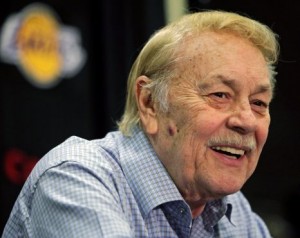Lakers owner Jerry Buss dead at 80
Jerry Buss, who bought the Los Angeles Lakers in 1979 and turned them into the N.B.A.’s glamour team, winners of 10 league championships and the cornerstone of his Southern California sports empire, died on Monday in Los Angeles. He was 80.
His death was announced by the Lakers. He had been hospitalized with cancer for much of the last 18 months.
A child of the Depression, Mr. Buss obtained a doctorate in physical chemistry and later prospered in real estate ventures, enabling him to pursue his love of sports.
He paid 67,5 million dollars to buy the Lakers from Jack Kent Cooke in a deal that included the Los Angeles Kings of the National Hockey League, the Forum sports arena in Los Angeles and Mr. Cooke’s California ranch.
In January, his Lakers were valued at $1 billion by Forbes magazine, second in the National Basketball Association to the Knicks’ 1,1 billion dollars valuation.
The death of Los Angeles Lakers owner Jerry Buss takes the questions beyond whether the franchise that won 10 NBA titles under him can salvage this season. The uncertainty now is whether the Lakers can sustain their lofty status in coming years.
Buss died Monday at Cedars-Sinai Medical Center in Los Angeles. He had been undergoing cancer treatment.
With this season’s Lakers struggling at 25-29 and 10th in the Western Conference entering the second half ot the season, team spokesman John Black said Buss had prepared the franchise for the transition ahead. His son Jim, the Lakers’ executive vice president of player personnel, has been running the basketball operations since 2011. His daughter, Jeanie, has overseen the business side.
“The future of the organization will remain unchanged. Dr. Buss set it up years in advance — he planned for the team to remain with the family” – Black said. “As far as the operation and running of the team, that will be unchanged.”
But it remains to be seen who will be the dominant voice in running the Lakers’ show, a job Buss did masterfully on the marketing and basketball side. Hall of Famer Magic Johnson clearly is aligned with Jeanie Buss.
“Now (Buss) leaves and incredible organization to his kids, and Jeanie Buss is so smart and intelligent” – Johnson said Monday in an interview with ESPN. “He sent her to (University of Southern California) business school, and he knew that he wanted her to be a major factor and be a part of the Laker organization and probably run it one day.”
You know how when someone dies we like to comfort ourselves by saying: “He’s in a better place now”?
That saying isn’t as necessary for Jerry Buss, the longtime Lakers owner who passed away Monday.
Buss was always in a better place.
Perhaps other team owners would get an invitation to a party at a friend’s house in their honor when they won a championship. In Buss’ case, it came from Hugh Hefner at the Playboy Mansion.
Whenever I interviewed Buss on the phone he would be somewhere enviable. When I was in Indianapolis for the 2000 NBA Finals he was at his Southern California beach house. On another occasion he was in Hawaii.
When the team was crumbling in the summer of 2004, with the greatest basketball coach of all time dispatched and the greatest center of his era shipped to Miami, Buss was in Italy, where he reported: “The pasta’s great and the wine’s flowing freely.”
Why worry? The Lakers always came back, they would always prevail. They had Kareem Abdul-Jabbar and Magic Johnson when Buss bought the team, the NHL’s Kings and their home arena, the Forum, in 1979. They won right away and kept on winning, adding James Worthy in 1982 and Mychal Thompson in 1987 to give them four players who had been drafted No. 1 overall.
In 1996, within a span of less than six weeks, the Lakers acquired Kobe Bryant and Shaquille O’Neal, who developed into one of the best tandems the NBA has ever seen.
The summer of 2004 was a blip. The subsequent season, in which they missed the playoffs, marked only the second time the Lakers were home for the postseason during Buss’ ownership. Then, on February 1, 2008, they traded for Pau Gasol, and they were on their way back to the NBA Finals for a three-year residency.
